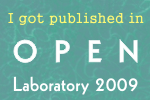Your Genome, Yourself?
We have Palaeolithic emotions, medieval institutions and God-like technologies.
E.O. Wilson
Whole genome sequencing will soon be cheap enough to be widely affordable. We are nearing the time when omics data may be retained for patients on a wide basis. These may include full exome, haplotype, full genome sequencing, tissue level transcriptomic data, microbiome and meta-transcrimtome, metabolome… the sky, or rather personal healthcare budget, is the limit.
Personal genomic advocates today present sequencing as a personal choice. When faced with concerns such as privacy, the general response from personalized medicine advocates is that the benefits outweigh privacy concerns, and in any case the people making the choice to sequence their genomes (at least now), are making an informed personal choice. This means that whatever possible detriment that may ensue from sequencing the genome will only affect that person. So, for example, denial of life insurance due to a genomic findings (legal in many countries) will only affect the person having their genome sequenced. In the US, where healthcare is privatized, denial of health insurance due to genetics is illegal, but the application of higher premiums is a concern. For example, some health insurance providers in the US charge higher premiums if the insured has two X chromosomes, although you usually don’t need full-genome sequencing to determine that genotype. Other privacy concerns may include the leaking (via legal or illegal means) of genomic information to various entities you may not want to have your DNA data.
Trouble is, getting your genome sequenced is not solely a personal choice: a person’s genomic information contains that of their family as well. So by having your own ‘omic information stored, you are making a choice for your siblings, parents, and children (including those yet unborn). So you are making a choice for them to know, or at least suspect, that they have certain genotypes they may or may not wish to know about. Michael Snyder, one of the strongest advocates of personal genomics has a habit of saying: “don’t sequence your genome if you are a worrier”. You may not be, but your unborn daughter may be. You may be able to correctly interpret the probabilistic data your genome provides, but your son or brother may not.
Or they may just be a private persons who would not want their genomic information out there, even by proxy. In realistic terms, by cross-referencing familial and genomic databases, your daughter may be denied certain health or life insurance coverage, based on a genotype an insurance company does not like: which may simply mean an over-interpretation of the limited predictive power of genomic data. By having your data accessible, some of her data are accessible as well, indirectly. No database is crack-proof, and re-identifying supposedly anonymous genomic data is surprisingly easy . Familial DNA matching, coupled with surreptitious collection of DNA is becoming common practice with law enforcement to generate suspect lists. As the availability of genomic data increases, so does the erosion of personal privacy.
This all sounds rather alarmist, counter-progressive, and may give me the appearance of a bit of a Luddite. Especially when coming from a genome scientist… What about the huge benefits that await us from personal genomics? Should privacy and unfounded (or well-founded) anxieties stand in the way of progress? My prediction: they probably won’t. As the cost of personal genomics decrease, and the benefits (currently somewhat hyped) increase, genotyping may start to be mandated by healthcare providers, and perhaps even some employers. But revisit the motto of this post: should we not, at least, consider some of the implications of our choices upon others, if not ourselves, given our “paleolithic emotions and medieval institutions”?

Source: CDC (Public Domain) http://blogs.cdc.gov/genomics/2011/08/25/think-before-you-spit-do-personal-genomic-tests-improve-health/
Comments are closed.


















